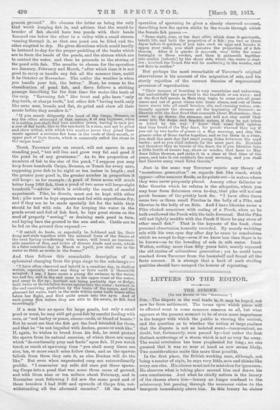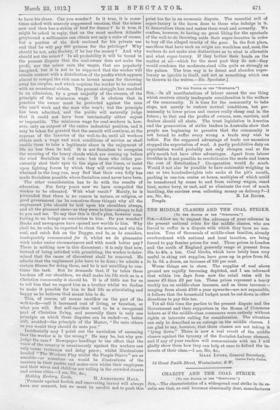LETTERS TO THE EDITOR.
THE STRIKE.
[TO T1114 EDITOR OF TEN " SPECTATOR."]
Sin,—The dispute in the coal trade is, it may be hoped, not now far from settlement. The terms upon which peace will be effected must in some measure concern us all, but what appears at the present moment to be of even more importance is the temper with which the public is viewing the contest, and the question as to whether the nation at large realizes that the dispute is not an isolated event—inconvenient, no doubt, but, fortunately, soon passed by—but rather the first distinct mutterings of a storm which is not so very far away. The social revolution has been prophesied for long ; no one guessed that it was so near at hand as now seems likely. Two considerations make this more than possible.
In the first place, the British working man, although, not being a master of style, he says very little, sees and thinks like every one else. His silence must not be mistaken for ignorance. He observes what is taking place around him and draws his own conclusions. And what he chiefly notices is the luxury of the classes above him—luxury no longer confined to the aristocracy, but passing through the nouveaux riches to the bourgeois immediately above him. In this luxury he claims to have his share. Can you wonder P Is it true, it is some- times asked with scarcely suppressed emotion, that the miner now and then has a sirloin of beef for dinner ? Is it true, it might be asked in reply, that on the most modern Atlantic greyhound a millionaire can obtain not only a suite of rooms, but a portion of the deck enclosed for his private use and that he will pay 800 guineas for the privilege P Why should he not, asks Society, if he has the money P And why should not the miner P In all probability it will be found in the present dispute that the coal-owner does not make the profit, nor the miner earn the wages, that are popularly imagined, but it is not to be supposed that the worker will remain content with a distribution of the profits -which appears almost to compel the rich man to invent means for throwing away his surplus, and which requires the worker to be content with an occasional sirloin. The present struggle has resulted in an admission, by a great majority of the owners, of the principle of the minimum wage. It is obvious that in practice the owner must be protected against the man Who can't work and the man who won't ; but the principle has been admitted, and the public will naturally judge that it could not have been intrinsically either unjust or impossible. The minimum wage for coal-workers is, how- ever, only an outpost of the entire industrial position, and it may be taken for granted that the assault will continue, at the expense of the luxuries of the well-to-do, until all workers obtain such a wage and such conditions of service as shall enable them to take a legitimate share in the enjoyment of life no less than its toil. It is not Socialism to recognize the meaning of the heavy clouds which are coming up before the wind Socialism is red ruin: but those who either per- sistently shut their eyes to the signs of the times, or insist upon fighting forces by which they will certainly be over- whelmed in the long run, may find that their own folly has made Socialism possible where Socialism need never have been. The other consideration has to do with the results of education. For forty years now we have compelled the worker to be educated. With what result P Mainly, he is persuaded that there is no reason in nature, or religion, or good government (as he conceives these things) why all the unpleasant jobs should be laid upon his shoulders always, and all the pleasant ones—as they seem to him—always to fall to you and me. To say that this is God's plan, however com- forting to us, brings no conviction to him, Do you wonder P Books and newspapers have opened new worlds to him. Why shall he, he asks, be expected to clean the sewers, and win the coal, and catch fish on the Dogger, and be, as he considers, inadequately remunerated for it, whilst we do pleasanter work under easier circumstances and with much better pay ?
There is nothing new in this discontent : it is only that now, instead of being satisfied with grumbling, the worker is deter- mined that the cause of discontent shall be removed. He admits that the unpleasant jobs have to be done ; he admits a certain fitness for doing them, and he is not unwilling to con- tinue the task. But he demands that, if he takes these burdens off our shoulders, we shall make his life such as in a Christian community it should be. It is of little use for us to tell him that we regard him as a brother whilst we decline to make it possible for him to find life as stimulating and happy as he believes God meant him to do.
This, of course, all means sacrifice on the part of the well-to-do—call it increased coat of living, or taxation, or what you will. Bat self-sacrifice used to be a recognized "part of Christian living, and assuredly there is only one principle on which these disputes can be ended—or, better still, avoided—the principle of the Master, " Do unto others as you would they should do unto you." Incidentally may I point out the unwisdom of assuming that the worker is in the wrong P He may be, but why pre- judge the case P Newspaper headings to the effect that the voice of the country is unanimously against the workers can only cause irritation and delay peace ; whilst illustrations headed "The Workers Play whilst the People Starve" are as sensible—or senseless—as would be illustrations of the masters in their yachts and motor-cars whilst their employees and their wives and children are toiling in the crowded streets and airless cities.—I am, Sir, &c., Mendell Rectory, Leeds. H. ARMSTRONG HALL. [Protests against foolish and enervating luxury will always have our sunnort, but we must be careful not to push this point too far in an economic dispute. The essential evil of super-luxury is the harm done to those who indulge in it.. It demoralizes them and makes them weak and cowardly. We confess, however, to having -no great liking for the spectacle of the well-to-do throwing aside their super-luxuries in order to buy off the alleged enmity of the poor. In the first place, sacrifices that have such an origin are worthless and, next, the workers do not make nice distinctions as to what is allowable and what super-luxury. If they bother their heads on the matter at all—which for the most part they do not—they would condemn the moderate-sized villa quite as strongly as the palace. The true way is to detest and abandon super- luxury as ignoble in itself, and not as something which can be thrown to the wolves.—En. Spectator.]







































 Previous page
Previous page